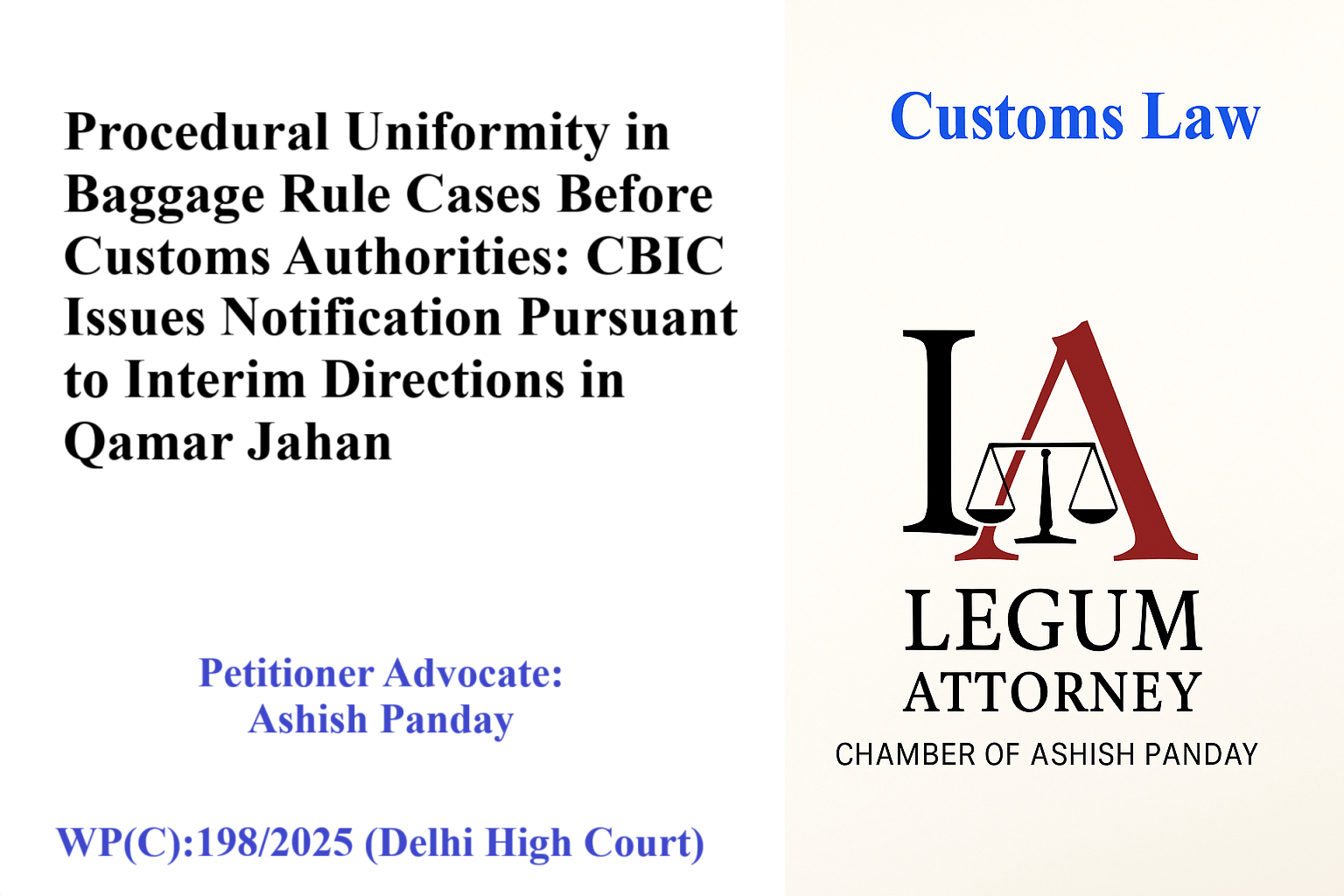Procedural Uniformity in Baggage Rule Cases Before Customs Authorities: CBIC Issues Notification Pursuant to Interim Directions in Qamar Jahan

Procedural Uniformity in Baggage Rule Cases Before Customs Authorities: CBIC Issues Notification Pursuant to Interim Directions in Qamar Jahan Case
In a significant move to streamline customs procedures and ensure fairness in enforcement, the Central Board of Indirect Taxes and Customs (CBIC) has issued a notification mandating procedural uniformity in handling baggage Rule-related cases across all customs formations in India.
The Central Board of Indirect Taxes and Customs (CBIC) has issued a standard operating procedure (SOP) to ensure uniformity in the handling of baggage-related cases at Indian airports. This development comes in the wake of interim directions issued by the Hon’ble Delhi High Court in the matter of Qamar Jahan v. UOI, which spotlighted procedural gaps and alleged inconsistencies in customs handling of personal jewellery and baggage seizures.
Qamar Jahan
This directive follows observations made by the Delhi High Court in Writ Petition (C) No. 198/2025, titled Qamar Jahan vs. Union of India & Others, a case led by Advocate Ashish Panday, which highlighted inconsistencies and procedural lapses in customs practices at airports.
The CBIC’s notification, F.No.450/35/2025–Cus IV, dated May 17, 2025, directs all Principal Chief Commissioners and Chief Commissioners of Customs and Central Tax to implement a set of standardized procedures while dealing with baggage under the Customs Act, 1962.
Key Procedural Mandates
- Detailed Detention Receipts:
Officers at Green and Red Channels must issue detention receipts that include:- Full name, phone number (including WhatsApp), email, and postal address (local/foreign) of the passenger
- Flight number, date and time of seizure
- Detailed description and net weight of seized items
- Names and signatures of both the passenger and the customs officer
- Copy of passport and boarding pass attached
- Photographic Evidence:
A photograph of the seized goods must be taken in the presence of the passenger and shared with them. One copy is to be retained by the customs department. - Clear Communication of Process:
Customs officers are instructed to explain the detention and appraisement process clearly to passengers, including expected timelines. - Show Cause Notice Procedure:
- A notice under Section 124 of the Customs Act can be oral if a written waiver is requested by the passenger.
- Waiver requests must be specific, not on pre-printed forms, and counter-signed by the customs officer.
- If a written notice is waived, a letter for personal hearing (with Document Identification Number – DIN) must be issued and sent via hand delivery, WhatsApp, post, or email.
- Personal Hearing and Representation:
Passengers (or their authorized representatives) must be given an opportunity to submit written representations. These should be recorded in their handwriting during the personal hearing, and must include the appraisal process. - Timely Order-in-Original:
Final orders must be issued at the earliest and communicated via post, email, and WhatsApp, with a note on the passenger’s right to appeal within 90 days (60 days + 30 days). The name and designation of the issuing officer must be mentioned. - Humane Consideration:
Requests for expedited appraisement or other issues from passengers should be treated with empathy and sensitivity. - Sensitization Measures:
Customs officers must be adequately sensitized about the Baggage Rules and related legal provisions, including the issuance of Export Certificates.
Legal Significance
The CBIC’s notification marks a crucial step in ensuring transparency, accountability, and uniformity in customs enforcement at ports of entry. It also emphasizes a passenger-centric approach and procedural fairness, aligning administrative conduct with judicial expectations.
Advocate Ashish Panday, who represented Qamar Jahan in the landmark case, welcomed the CBIC’s move, stating, “This is a much-needed reform. The High Court’s observations have rightly pushed the department toward uniform and humane enforcement. It’s a win for due process.”
